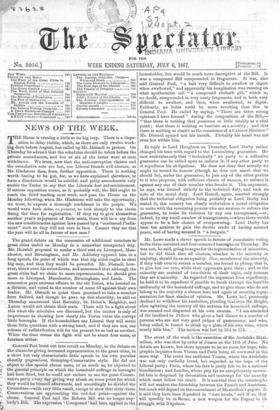General Peel burst out into revolt on Monday, in the
debate on the clause for giving increased representation to the great cities, in a short but very characteristic little speech in his own peculiar cheerily pugnacious, thumping-Conservative style. He did not object to this special clause more, or so much as he objected to
5 the general principle on which the household suffrage in boroughs had been fixed, but he could not endure to see the great Conser- vative party every day giving way afresh on some point for which they would be blamed afterwards, and accordingly he divided the Committee—with very little result, except to show that sixty-three Conservatives are approaching the red-hot point—against the clause. General Peel said the Reform Bill was no longer any- body's Bill. The expression 6 Compound' had been applied to the householder, but would be much more descriptive of the Bill. was a compound Bill compounded in fragments. It was, also said General Peel, " a bait very difficult to swallow or digest when swallowed," and apparently his imagination was running on what apothecaries call " a compound rhubarb pill," which is, no doubt, compounded in very nasty fragments, and is both very difficult to swallow, and then, when swallowed, to digest. Evidently, no bolus could be more revolting than this to General Peel. He ended by saying, " There are three strong opinions I have formed " during the composition of the
"that there is nothing that possesses so little vitality as a vital point ; that there is nothing so insecure as a security ; and that there is nothing so elastic as the conscience of a Cabinet Minister." Mr. Disraeli opened not his month. Probably his heart was not even hot within him.






























